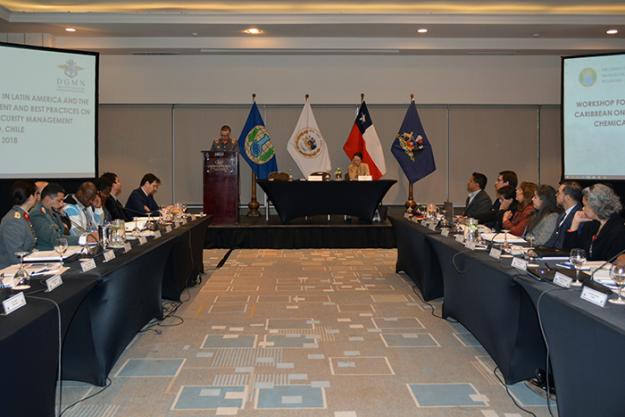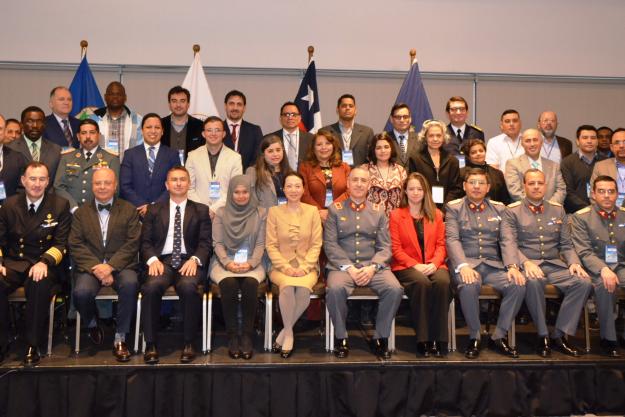
Experts from Latin America and the Caribbean during a Workshop on Needs Assessment and Best Practices on Chemical Safety and Security Management.
THE HAGUE, Netherlands – 6 July 2018 – Experts from Latin America and the Caribbean shared key insights during a Workshop on Needs Assessment and Best Practices on Chemical Safety and Security Management, held in Santiago, Chile from 3 to 5 July.
The workshop, organised by the Organisation for the Prohibition of Chemical Weapons (OPCW) in collaboration with the Government of Chile, contributed to the creation of a comprehensive inventory of OPCW Member States’ needs, tools, guidance, and best practices related to chemical safety and security management.
The Director-General of National Mobilization, National Authority, Chile, General of Brigade Jorge Morales Fernandez, spoke about the importance of chemical safety and security management for countries in Latin America and the Caribbean. During his address the Director-General stated that the event is “a valuable opportunity to continue working on the implementation of this important international disarmament treaty (CWC) and its objectives”.
OPCW’s Head of International Cooperation Branch (ICB), Mrs Xiaohui Wu, encouraged States Parties from the Region to further share their specific needs in chemical safety and security management with the Secretariat, and to provide information on their respective countries’ existing tools, guidance and best practices in this area.

Group photo of attendees at a Workshop on Needs Assessment and Best Practices on Chemical Safety and Security Management, held in Santiago, Chile.
Participants examined various components of chemical safety and security management, including trends and challenges; threat assessments and mitigation measures; gaps in chemical safety and security management; and efforts to build safety and security culture along the chemical supply chain. Attendees also visited Oxiquim S.A. to witness the practical application of chemical safety and security management procedures in Chile’s chemical industry.
The workshop was attended by 35 participants from the following OPCW Member States: Argentina, Barbados, Belize, Bolivia, Brazil, Chile, Columbia, Costa Rica, Cuba, Ecuador, Italy, Guatemala, Grenada, Guyana, Mexico, Nicaragua, Panama, Paraguay, Peru, Poland, Trinidad and Tobago, Uruguay, and Venezuela.
Background
As the implementing body for the Chemical Weapons Convention, the OPCW oversees the global endeavour to permanently and verifiably eliminate chemical weapons. Since the Convention’s entry into force in 1997 – and with its 193 States Parties – it is the most successful disarmament treaty eliminating an entire class of weapons of mass destruction.
Over 96% of all chemical weapon stockpiles declared by possessor States have been destroyed under OPCW verification. For its extensive efforts in eliminating chemical weapons, the OPCW received the 2013 Nobel Peace Prize.
